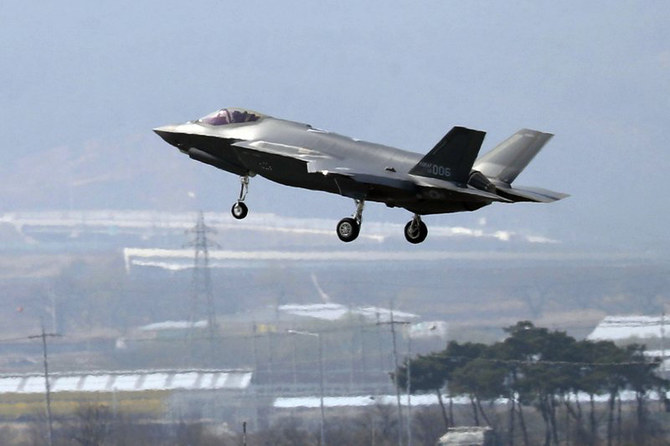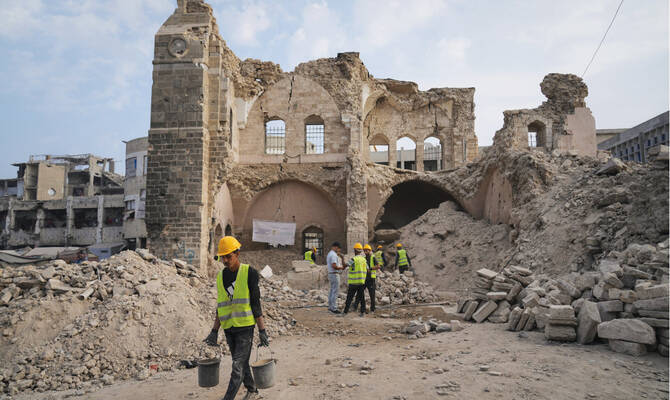ANKARA: The US has reportedly informed Turkey of its formal exclusion from the new F-35 consortium agreement.
The long-awaited decision comes as little surprise, following Turkey’s acquisition of Russia’s S-400 anti-aircraft weapons system, amid fears over its compatibility with the F-35 and its possible use for Moscow to obtain intelligence on NATO members.
Turkish companies are expected to fulfill commitments to manufacturing thousands of parts for the F-35 program until next year, but Ankara will no longer be able to obtain the aircraft.
Turkey now faces a decision over its direction in terms of military procurement, with relations with Moscow complicated by the latest standoff between Ankara and Kremlin over Ukraine.
Sinan Ulgen, a former Turkish diplomat and chairman of the Istanbul-based Center for Economics and Foreign Policy (EDAM), told Arab News: “Exclusion from the F-35 program has two important consequences. One is obviously about the companies that have until now participated in the manufacturing process of the F-35s. There is no going back because the manufacturing process shifted away from Turkey to other countries.”
The other consequence, he said, concerned the Turkish airforce and Ankara’s deterrence power without the acquisition of the fifth-generation aircraft.
“There is no real, tangible way to replace the F-35s with another such platform. The only commercially available fifth-generation platforms that could potentially replace them is the Russian Su-57, and the Chinese (Chengdu J-20) but both of them will create more complications given that they are not NATO-interoperable, and it would be considered a signal that Turkey is distancing itself further away from the West,” Ulgen added.
In February, Turkey hired a Washington-based lobbying firm to attempt to orchestrate a return to the F-35 program with a six-month contract, claiming that its removal was not fair.
The lobbyists were also expected to get back money Ankara paid to buy over 100 of the jets, but as yet nothing has come of this.
“Turkey could work on creating the conditions for its return to the F-35 program, which will require an elaborate negotiation with the US. If that is not possible, and if CAATSA (Countering America’s Adversaries Through Sanctions Act) sanctions are not lifted, Turkey could create its own domestic fighter plane (development) program,” Ulgen said.
“So far, there has been no solution for manufacturing (an) engine for that potential plan. Secondly, even if that problem is solved, Turkey can only acquire a sizeable number of these airplanes — realistically speaking — in a timeframe of between 2025 and 2030, which means that Turkey’s air superiority will be diminished given that many countries in the region have started to require fifth-generation planes. It will be a strategic gap if it is not addressed properly.”
On Thursday, Selcuk Bayraktar, executive of Turkish drone producer Baykar, and son-in-law of Turkish President Recep Tayyip Erdogan, announced that his firm had accelerated its National Unmanned Combat Aircraft project.
It remains to be seen to what part Russia will play in future Turkish military procurement.
As Ankara voices support for Kiev amid Russian military reinforcement along its border with Ukraine, Turkey’s defense ties with Moscow might become unsustainable in the short run.
Russian Deputy Prime Minister Yuri Borisov said on Wednesday the Kremlin will scrutinize the prospect of military and technical cooperation with Turkey if Ankara delivers drones to Ukraine.
That was triggered by a report in Turkey’s pro-government Turkiye newspaper claiming that Ankara was ready to sell its weapons and drones to all countries, including Ukraine, following their successful deployment in the recent conflict between Armenia and Azerbaijan in Nagorno-Karabakh.
Ulgen said the future of military and industrial cooperation with Russia remains clouded, with Borisov’s statement showing how difficult it would be to rely on Moscow as a safe partner.
“It also demonstrates the differences between trying to find alternative suppliers outside of the NATO framework. Unlike some NATO partners like Canada, which halt supplies of some specific materials and don’t go beyond that, Russia is trying to gain and use leverage over Turkey, and put pressure on Turkey’s foreign policy positions through its supply lines to the military,” he said.
Last week, Canada canceled permits for high-tech arms exports to Turkey over the “credible evidence” that the Canadian technology, as an end-user, was diverted to the fighting in Nagorno-Karabakh last year.
















